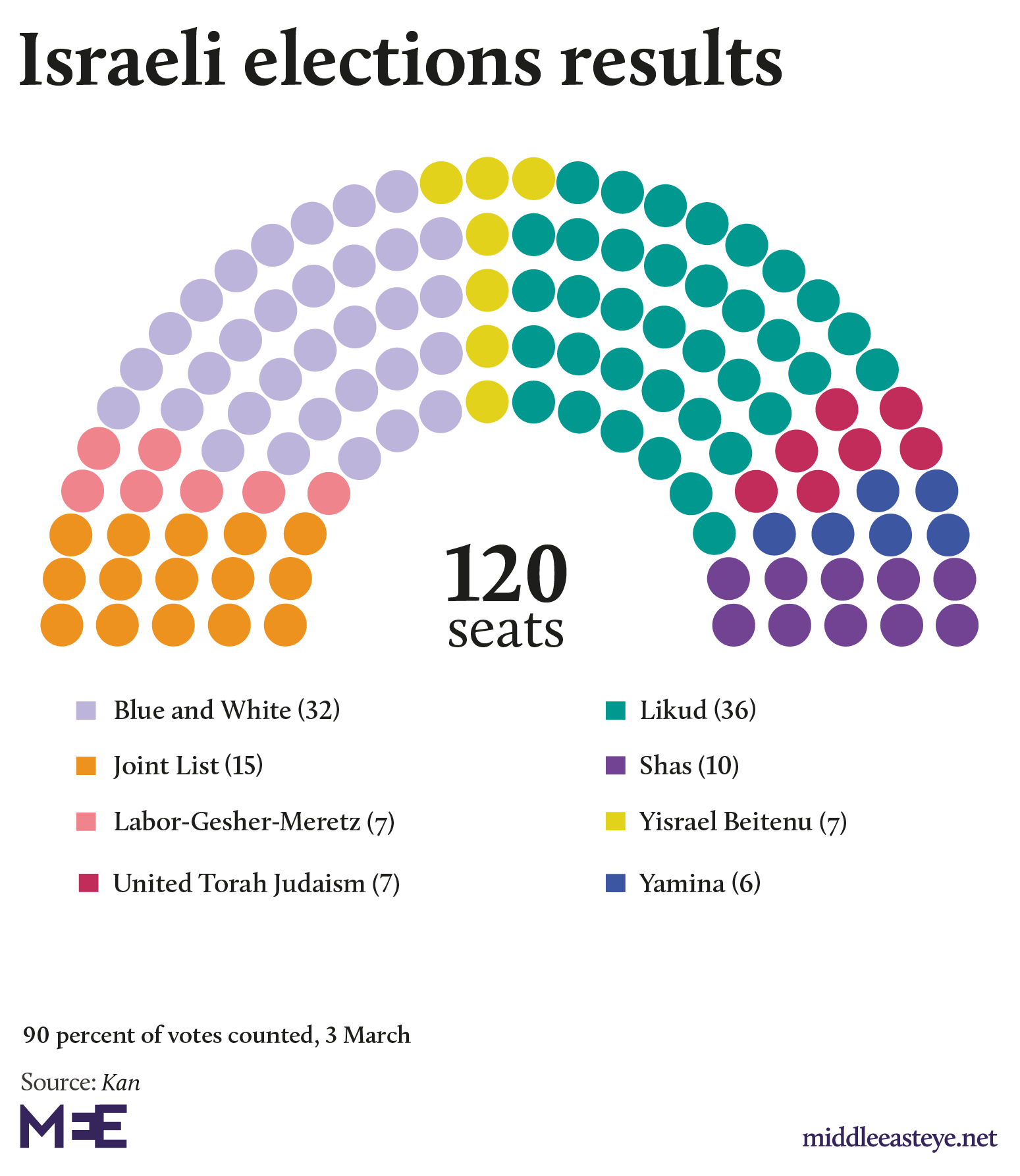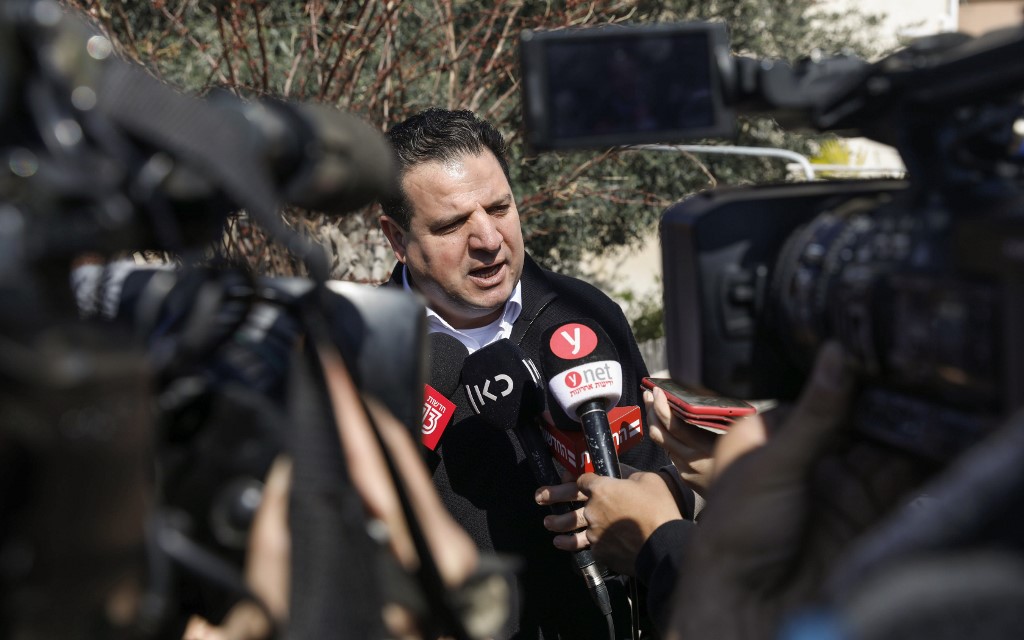Israeli voters give Netanyahu a new lease, but the crown is just out of reach

It may have taken him a year and three elections to achieve it, but on Tuesday, Benjamin Netanyahu started to look like the Great Houdini of Israeli politics – escape artist extraordinaire.
With almost all of the ballots counted, Netanyahu’s bloc of settler and extreme religious parties was set to win 58 seats in the 120-member parliament – three shy of an absolute majority.
Netanyahu simply wore down the resistance of an electorate tired of repeated elections
But more importantly, his Likud party is expected to secure three more seats than his chief rival, Benny Gantz, a former army general who leads the secular right-wing Blue and White party.
Netanyahu managed his win even though the attorney general recently indicted him on a raft of corruption charges. His trial is due to start in two weeks.
The rationale behind Blue and White’s creation was to oppose Netanyahu, arguing that his increasingly authoritarian and corrupt government is a threat to Israel’s democratic institutions and the rule of law. Blue and White has lost that argument at the ballot box.
Stay informed with MEE's newsletters
Sign up to get the latest alerts, insights and analysis, starting with Turkey Unpacked
Netanyahu isn’t quite out of the woods yet, but Gantz has no path to power himself, given his racist refusal to countenance support from the Joint List, representing Israel’s large minority of Palestinian citizens.
As one Likud official noted: "It’s either Netanyahu's government or another election."
Gantz on the backfoot
The two party leaders have been locked in a political impasse for the past year, tying for votes and neither able to form a government alone. But this election result puts Netanyahu firmly on the offensive and Gantz on the backfoot.
Netanyahu will use his success as a way, over the coming weeks of negotiations, either to browbeat Gantz into supporting him in a unity government, or to chip away at Gantz’s more hawkish legislators, hoping to prise off some as defectors.
As the results firmed up, it was revealed that Likud officials had already started blackmailing one of Gantz’s wavering legislators, Omer Yankelevich, threatening to release embarrassing private recordings.
Another possibility is that Netanyahu may manage to lure back into his fold his secular far-right nemesis, Yisrael Beiteinu leader Avigdor Lieberman, who has seven seats. Lieberman abandoned Netanyahu, and triggered the round of elections, in a feud over the rabbinical parties that are a bedrock of the ultra-nationalist bloc. But Lieberman has also promised not to allow a fourth election.
Netanyahu may even try to tempt into his bloc Orly Levy-Abekasis, the only legislator for the centre-right Gesher party, which joined an electoral pact with the Labor party.
'Unassailable' mandate
This is what Netanyahu appeared to mean when he called for “reconciliation” in his victory speech.
He will argue that the Israeli public has given him an unassailable mandate that trumps his indictment.
Gantz may rightly be afraid that, if he continues to refuse to sit with Netanyahu and pushes for a fourth election, he will be blamed by voters and his party may pay an even steeper price in the next round of voting. That may ultimately give Netanyahu the absolute parliamentary majority he needs.
There are dangers for Blue and White, whatever it decides. Its opposition to Netanyahu has been more personal than political, and a unity government could slowly void Gantz’s party of purpose.
Blue and White, Netanyahu may hope, will eventually go the way of other short-lived secular right-wing parties that broke from Likud and donned a centre-right mantle, such as Ariel Sharon’s Kadima and Tzipi Livni’s Hatnua.
Tricky escape from trial
But even if Netanyahu can wriggle free of the straitjacket of electoral maths to which he has been captive for the past 12 months, he still needs to escape the sealed water tank: his imminent trial.
That may prove far trickier. His hope had been that with a majority in parliament, he could strike a triple blow against the legal and judicial systems.
The attorney general, Avichai Mandelblit, would have to be removed, and Netanyahu’s bloc could then pass French-style legislation providing him with legal immunity from prosecution while he was running the country.
Armed with an election win, Netanyahu and his supporters are quite capable of turning this moment into a constitutional crisis
In addition, he would intensify his assault on the Supreme Court, stripping it of oversight powers – a long-held dream for the ultra-nationalist right, which sees the judiciary as placing a restraint, however minimal, on its freedom to expand settlements and annex parts of the West Bank.
But the price of an alliance with Blue and White, or sections of it, will probably be Netanyahu’s submission to the trial and the court’s judgment.
Yet, armed with an election win, Netanyahu and his supporters are quite capable of turning this moment into a constitutional crisis. They will try to frame it as a struggle between a democratically elected prime minister and an unelected, unaccountable, elitist and “leftist” Supreme Court trying to depose him.
As a Haaretz editorial opined, Netanyahu's victory will be presented as "a vote of no-confidence in the legal system, the police, the prosecution and the attorney general".
Bribes and smears
Netanyahu’s dramatic turnaround in fortunes appears to have had several causes.
He had been given a forceful tailwind by US President Donald Trump’s release in January of a so-called “peace plan” that effectively promised Netanyahu’s bloc almost everything it wanted: annexation of the most prized sections of the West Bank, leaving Palestinians with remnants that would be impossible to shape into a state.
More generally for Israelis keen to see the Palestinian issue disappear once and for all, Netanyahu suggested that he alone could harness the special relationship with Trump to make annexation a reality.
Netanyahu showered incentives on his ultra-nationalist allies to ensure they turned out in high numbers. That included promising new settlements in key Palestinian areas around East Jerusalem that until now had been a red line with the international community.
Netanyahu also relentlessly smeared Gantz. Many assumed the strategy would backfire, so transparent were Netanyahu’s dirty tricks, but it looks to have paid off handsomely.
Perhaps most importantly of all, Netanyahu simply wore down the resistance of an electorate tired of repeated elections.
Gantz’s main problem was that he had no real hope of forming a government without the help of the Palestinian parties in the Joint List. A vote for Gantz simply prevented Netanyahu from winning. It couldn’t end the year-long stalemate.
Faced with the likelihood of a fourth election, a section of Gantz’s supporters appear to have given up on their dislike of Netanyahu and returned to his Likud party.
Anger at land swaps
Overshadowed by the main drama between Netanyahu and Gantz, the other significant election story was a surge of support for the Joint List, the faction representing Israel’s large Palestinian minority.
If they win 15 seats, as currently predicted, it will be their highest representation in parliament ever – and two more legislators than they won in September. They are now the third-largest party by some margin.
Although it is too early to know for sure why the turnout for the List has jumped, there are three likely explanations.
Palestinian citizens, a fifth of Israel's population, appear to feel for the first time that their vote matters – or at least that it needs to matter
One is that Palestinian citizens, a fifth of Israel’s population, appear to feel for the first time that their vote matters – or at least that it needs to matter.
In April last year, in the first election of the current cycle, less than half of the minority’s voters turned out, winning the List 10 seats. This time it is likely that some two-thirds cast a ballot.
In part, that relates to the Trump plan, which promotes an ambition harboured by the Netanyahu-led right for so-called “land swaps”. These would allow Israel to annex the settlements, and in return, a quarter of a million Palestinians would be stripped of their Israeli citizenship and assigned to the patchwork Palestinian “state-in-waiting”.
This threat – ethnic cleansing by sleight of hand – almost certainly riled many Palestinian citizens who had previously boycotted the elections or were too disillusioned to turn out. They wanted to show that their citizenship cannot be discounted, neither by Trump nor Netanyahu.
Newfound power
But the upturn for the Joint List predates the Trump plan. In September, the minority’s turnout climbed to nearly 60 percent.
Until recently – and certainly since the eruption of the Second Intifada 20 years ago – there had been a sense that Israeli politics was an exclusively Jewish affair. The Zionist majority were agreed on the political fundamentals, and Palestinian citizens believed they could make no difference. Their voice was entirely irrelevant.
But the last three elections have suggested a slightly different lesson. True, the minority is still mostly not heard. In fact, Netanyahu’s opponents – both in Gantz’s Blue and White and in a new Labor-led coalition – actively distanced themselves from the Joint List, as Netanyahu bated them that it would be immoral to rely on “Arab” legislators to rule.
What the three elections proved instead is that, through their votes, the minority could block Netanyahu’s path to power and thereby inflict revenge for his constant incitement against them and their representatives as traitors and the enemy of a Jewish state.
Indeed, had the turnout by Palestinian citizens been significantly lower, Netanyahu would probably have secured the 61 seats he needed.
It was precisely his fear of Palestinians voting that led Netanyahu to tone down his incitement against the minority during the final stages of the campaign. Previous remarks, such as that “Arabs want to annihilate us all – women, children and men” backfired in the last election in September, driving up the minority’s turnout.
This newfound sense of power, however, may not last long. It derives from Netanyahu having bitterly divided the Jewish electorate. Without him, a Zionist consensus – one that treats Palestinians as mere pawns to be moved at will on a Jewish chessboard – is likely to re-establish itself quickly.
Peace camp's demise
The other likely explanation for the surge – and a hopeful one – is that record numbers of Israeli Jews appear to have backed the Joint List.
The List comprises four political parties, only one of which – the socialist Hadash – claims to be a joint Arab-Jewish party. Its traditional, single slot for a Jewish legislator in a realistic position on its slate reflected the fact that very few Israeli Jews support the party.
Decline in Jewish support was only exacerbated when Hadash was forced by a new threshold law to enter the Joint List pact in time for the 2015 election. It had to rub shoulders with an Islamist party and a liberal party that explicitly rejects Israel as a Jewish state.
So why the apparent change in this election?
Jews who identify as belonging to the peace camp have found their traditional “Zionist left” parties – Labor and Meretz – deserting them. As the Israeli Jewish public lurches ever further rightwards, the two “peace” parties have chased after them. Neither now talks about Palestinian statehood or ending the occupation.
The nail in the coffin came in this election when – to save itself from electoral oblivion – Meretz, the most left-wing of the Zionist parties, entered into a formal coalition not only with the centrist Labor party, but with Gesher, whose leader Levy-Abekasis was a refugee from Lieberman’s far-right Yisrael Beiteinu party.
Labor, Israel’s founding party, and Meretz hoped the move would bolster their strength. Instead, it has marked another major stepping stone to their demise. Together, they are predicted to win seven seats, just one more than Labor won by itself last April – its worst performance ever until that point.
'A true left'
The Israeli centre is being squeezed: Labor’s more hawkish supporters have shifted to Blue and White, while the peaceniks in Meretz appear to be flirting with the Joint List.
It may prove to be the only silver lining in a far darker picture from this election
It may only be small numbers, but it is an encouraging – near-revolutionary – development. It suggests that for the first time in Israel’s history, there is a genuine peace camp emerging among the Jewish population. Not one chasing an illusory two-state solution, based on Jewish privilege, but one prepared to sit alongside and support Palestinian parties in Israel, even as a junior partner.
The Joint List’s leader, Ayman Odeh, celebrated this change on Tuesday, stating: “This is the beginning of the rise of a true left.”
It may prove to be the only silver lining in a far darker picture from this election. Much of the Israeli Jewish public have made clear not only that, yet again, they do not care about the abuse of Palestinians, under occupation or as citizens, but that they have now grown inured to authoritarianism and abuses at home of what is left of their democratic institutions.
The views expressed in this article belong to the author and do not necessarily reflect the editorial policy of Middle East Eye.
This article is partially available in French on Middle East Eye French edition.
Middle East Eye delivers independent and unrivalled coverage and analysis of the Middle East, North Africa and beyond. To learn more about republishing this content and the associated fees, please fill out this form. More about MEE can be found here.










